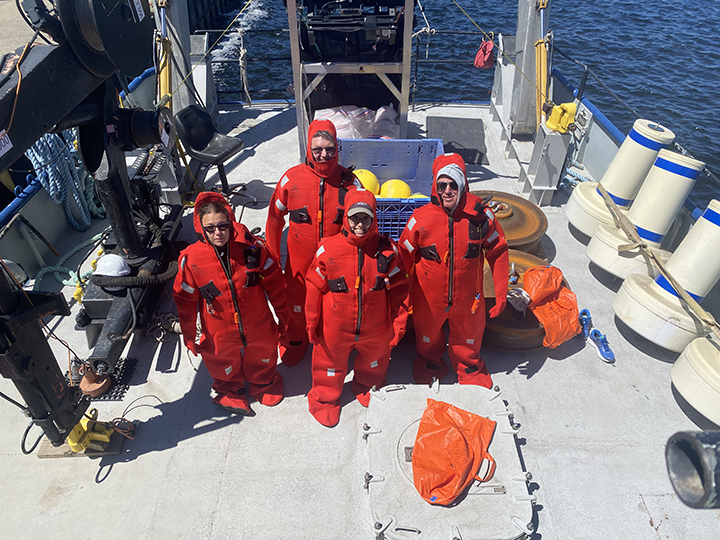Teachers visit TBNMS for hands-on Great Lakes knowledge

Courtesy Photo Visiting educators pose in front of the Laurentian, a research vessel they sailed in on from Muskegon this week. Pictured, from left, are high school teacher Carley Kratz of Lenawee County, middle/high school math teacher Lonny Cruff of Au Gres, middle school teacher Bob Budak of Angola, Ind., and Meaghan Gass, MSU Extension and Michigan Sea Grant Extension educator.
ALPENA — A small group of educators visited Alpena this week on a research vessel that sailed into Thunder Bay from Muskegon. The Laurentian brought the visitors, who had the opportunity to participate in research in the Thunder Bay National Marine Sanctuary.
The teachers can now take the hands-on data and knowledge they gained back to the classroom, teaching students from their own experience. The goal is to get more Great Lakes learning into the classroom, beyond just that in cities and towns that touch the Great Lakes, and for students to understand the impact humans have made and can make toward securing a clean water future.
Meaghan Gass works for Michigan State University Extension and Michigan Sea Grant, serving the Saginaw Bay Region as a Sea Grant Extension educator.
“The teachers are here as part of a shipboard science workshop supported by the Center for Great Lakes Literacy,” Gass said, adding that it is a Sea Grant-led program.
She explained the term, “Great Lakes literacy.”

Courtesy Photo On Monday, the educators had to wear bright red, bouyant neoprene immersian suits upon boarding the Laurentian. Using the suits is a marine safety measure required because of choppy weather in the forecast that day.
“That is, how we have an impact on the Great Lakes, and how the Great Lakes have an impact on us,” Gass said. “So, the goal here is to increase connections to that, and help support educators when they go back into the classroom, and integrate more hands-on learning connected to the Great Lakes.”
Gass explained the research the teachers have been participating in.
“We’ve been doing more sampling connected to acidification,” Gass said. “Helping to gather data around that issue that’s connected to climate change, and getting a better baseline understanding of the impact of CO2 in our Great Lakes, and how acidification might have an impact here.”
While in Alpena earlier this week, they were able to go out on the Lady Michigan glass-bottom boat, as well as enjoy strolling around this friendly little town.
Bob Budak teaches middle school science in Angola, Ind.
“Anytime that I get to the Great Lakes to do a study, I’m on board,” Budak said, adding that many of his students have never been to a Great Lake, as Lake Michigan is about two hours from where they live. “When we go outside to take water samples for water quality, or we go down to a park by our school, I tell them that this water is going to make its way into Lake Michigan … When they can make that connection, it’s valuable.”
Lonny Cruff teaches middle and high school math in Au Gres. He’s excited to take his experience back to school.
“It gives me the ability to put a practical spin on something when I stand in front of a group of kids,” Cruff said. “So that all of this work that we’re doing, all of this investigation, all these problems, all these calculations, aren’t just theoretical, but they really are used … As a math and science person, it’s just fascinating to see the practical application of the things that we talk about theoretically.”
Carley Kratz is the instructor of the natural resources program at the Lenawee Intermediate School District Center for a Sustainable Future, headquartered in Adrian, Michigan. She teaches juniors and seniors in CTE programs.
“I think the biggest part of my job is trying to help the students figure out their career paths, and this has really opened my eyes, and will help me pass some advice along to them,” Kratz said. “There are a lot more jobs out there in Michigan.”
She said jobs relating to the Great Lakes, such as working in fisheries or marine biology, can be overlooked when you don’t live right on the water, but she will have more options for students to consider upon returning home.
After the research adventure is over, and they return back into their classrooms, each teacher will receive a $500 project stipend from the Great Lakes Restoration Initiative to help support more hands-on learning in the classroom, according to Gass.
She added that in about a month, another group of teachers will come to Alpena to learn about invasive mussels in our Great Lakes.
In this, his first visit to Alpena, Budak was impressed with the city’s people and charm.
“Last night I was walking around, and I was just thinking, ‘This is a great community,'” Budak said. “It’s a great small town, here along the coast … Everyone is so nice here.”
- Courtesy Photo Visiting educators pose in front of the Laurentian, a research vessel they sailed in on from Muskegon this week. Pictured, from left, are high school teacher Carley Kratz of Lenawee County, middle/high school math teacher Lonny Cruff of Au Gres, middle school teacher Bob Budak of Angola, Ind., and Meaghan Gass, MSU Extension and Michigan Sea Grant Extension educator.
- Courtesy Photo On Monday, the educators had to wear bright red, bouyant neoprene immersian suits upon boarding the Laurentian. Using the suits is a marine safety measure required because of choppy weather in the forecast that day.






